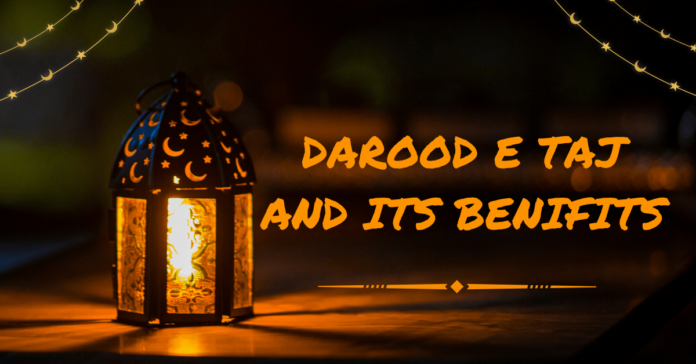Introduction to Darood Taj
“Darood Taj” is one of the most revered and spiritually uplifting salawat (invocations of blessings) upon the Prophet Muhammad (peace be upon him). Known for its profound impact and immense benefits, this blessed recitation is cherished by millions of Muslims worldwide. The word “Taj” means “crown,” symbolizing the honor and glory it bestows upon those who recite it regularly.
In Islamic tradition, reciting salawat, especially Darood Taj, serves as a means to seek closeness to Allah, obtain peace, and invoke divine mercy. This specific darood is believed to bring spiritual enlightenment, protection from harm, and fulfillment of wishes.
Historical Significance of Darood Taj
The origin of Darood Taj is not explicitly mentioned in hadith literature but has been transmitted through the teachings of scholars and spiritual leaders. Its recitation has been recommended for various spiritual, emotional, and physical benefits. Traditionally, it is believed to have been composed by renowned scholars as a way to express deep love and veneration for the Prophet Muhammad (PBUH).
Durood Taj In Arabic :
اللَّهُمَّ صَلِّ عَلَىٰ سَيِّدِنَا وَمَوْلَانَا مُحَمَّدٍ صَاحِبِ التَّاجِ وَالْمِعْرَاجِ وَالْبُرَاقِ وَالْعَلَمِ دَافِعِ الْبَلآءِ وَالْوَبَآءِ وَالْقَحْطِ وَالْمَرَضِ وَالْأَلَمِ اِسْمُهُ مَكْتُوبٌ مَرْفُوعٌ مَشْفُوعٌ مَنْقُوشٌ فِي اللَّوْحِ وَالْقَلَمِ سَيِّدِ الْعَرَبِ وَالْعَجَمِ جِسْمُهُ مُقَدَّسٌ مُعَطَّرٌ مُطَهَّرٌ مُنَوَّرٌ فِي الْبَيْتِ وَالْحَرَمِ شَمْسِ الضُّحَ بَدْرِ الدُّجَى صَدْرِ الْعُلَى نُورِ الْهُدَى كَهْفِ الْوَرَى مِصْبَاحِ الظُّلَمِ جَمِيلِ الشِّيَمِ شَفِيعِ الْأُمَمِ صَاحِبِ الْجُودِ وَالْكَرَمِ وَاللهُ عَاصِمُهُ وَجِبْرِيلُ خَادِمُهُ وَالْبُرَاقُ مَرْكَبُهُ وَالْمِعْرَاجُ سَفَرُهُ وَسِدْرَتُ الْمُنْتَهَى مَقَامُهُ وَقَابَ قَوْسَيْنِ مَطْلُوبُهُ وَالْمَطْلُوبُ مَقْصُودُهُ وَالْمَقْصُودُ مَوْجُودُهُ سَيِّدِ الْمُرْسَلِينَ خَاتِمِ النَّبِيِّينَ شَفِيعِ الْمُذْنِبِينَ أَنِيسِ الْغَرِيبِينَ رَحْمَةٍ لِلْعَالَمِينَ رَاحَةِ الْعَاشِقِينَ مُرَادِ الْمُشْتَاقِينَ شَمْسِ الْعَارِفِينَ سِرَاجِ السَّالِكِينَ مِصْبَاحِ الْمُقَرَّبِينَ مُحِبِّ الْفُقَرَاءِ وَالْغُرَبَاءِ وَالْمَسَاكِينِ سَيِّدِ الثَّقَلَيْنِ نَبِيِّ الْحَرَمَيْنِ إِمَامِ الْقِبْلَتَيْنِ وَسِيلَتِنَا فِي الدَّارَيْنِ صَاحِبِ قَابَ قَوْسَيْنِ مَحْبُوبِ رَبِّ الْمَشْرِقَيْنِ وَالْمَغْرِبَيْنِ جَدِّ الْحَسَنِ وَالْحُسَيْن مَوْلَانَا وَمَوْلَى الثَّقَلَيْنِ أَبِي الْقَاسِمِ مُحَمَّدِ بْنِ عَبْدِ اللهِ نُورٍ مِنْ نُورِ اللهِ يَا أَيُّهَا الْمُشْتَاقُونَ بِنُورِ جَمَالِهِ صَلّوُا عَلَيْهِ وَآلِهِ وَأَصْحَابِهِ وَسَلِّمُوا تَسْلِيمًا
Transliteration of Darood Taj
Here is the transliteration of Darood Taj for those who wish to memorize and recite it:
“Allahumma salli wa sallim wa baarik ‘ala Sayyidina Muhammadin sahib at-taji wal mi’raaj wal buraaq wal ‘alam. Daafi’il balaa’i wal wabaai wal qahti wal maradi wal ‘alam. Ismuhu maktoobun marfu’un mashhoorun fil lawhi wal qalam. Sayyidil ‘arab wal ‘ajam. Jismuhu muqaddas, mu’attarun, mutahharun munawwarun fil bayti wal haram. Shamsid duhaa badrir dujaa sadril ‘ulaa nooril huda kahfil wara misbahiz zulam. Jameelish shiyam, shafii’ul umam. Sahibil judi wal karam. Wallahu ‘aasimuhu wa Jibrailu khaadimuhu, wal buraaqu markabuhu, wal mi’raaju safaruhu, wa Sidratul Muntaha maqamuhu, wa qaba qawsayni matlubuhu, wa matlubuhu maqsooduhu, wa maqsooduhu mawjooduhu. Sayyidil mursaleen, khaataminnabiyyeen, shafi’il muznibeen, aneesil ghareebeen, rahmatul lil ‘aalameen. Raahatil ‘aashiqeen, muradil mushtaqeen, shamsil ‘aarifeen, sirajis saalikeen, misbahil muqarrabeen. Mahbubir Rabbil ‘aalameen. Jaddil Hasani wal Husayn, Maulana wa Mawla ath thaqalayn, Sayyidina Muhammadin ibni ‘Abdillah, noorim min noorillah. Yaa ayyuhal mushtaqoon bi noori jamalihi sallu ‘alaihi wa aalihi wa ashaabihi wa sallim.”
Translation of Darood Taj
“O Allah! Bestow blessings and peace upon our Master Muhammad, the possessor of the crown, the mi’raj, the buraq, and the banner. He is the remover of calamities, plagues, drought, disease, and suffering. His name is written, exalted, and prominent in the Tablet and the Pen. He is the leader of Arabs and non-Arabs. His body is sanctified, fragrant, purified, and illuminated in the House and the Sanctuary. He is the sun of the morning, the full moon of the night, the foremost leader, and the light of guidance, the cave of refuge, and the lamp that dispels darkness. He is of noble character, the intercessor for the nations, the possessor of generosity and kindness. Allah is his protector, Jibreel is his servant, the Buraq is his mount, the Mi’raj is his journey, and Sidratul Muntaha is his destination. His desire is fulfilled, his aim is achieved, and his need is granted. He is the master of the messengers, the seal of the prophets, the intercessor for sinners, the friend of the strangers, the mercy to the worlds, the comfort of the lovers, the desire of the yearning ones, the sun of the knowers, the lamp of the seekers, and the light of the closest ones. He is the beloved of the Lord of the worlds. He is the grandfather of Hasan and Husayn, our master and the master of both worlds, our leader Muhammad, the son of Abdullah, a light from the light of Allah. O those who yearn for his radiant beauty, send blessings upon him and his family and companions and send peace.”
Benefits of Reciting Darood Taj
Reciting Darood Taj holds numerous spiritual, psychological, and physical benefits. Some of the key advantages include:
- Protection from Calamities: Darood Taj is believed to shield the reciter from afflictions, diseases, and misfortunes.
- Fulfillment of Wishes: Many believers testify to their prayers being answered after consistently reciting this powerful invocation.
- Spiritual Enlightenment: It brings peace to the heart, strengthens the connection with Allah, and enhances spiritual growth.
- Blessings in Life and Afterlife: It invites blessings in daily life and ensures a place of honor in the hereafter.
- Healing: It is recited for physical and emotional healing.
- Divine Mercy: Darood Taj attracts Allah’s mercy and forgiveness for the reciter and their loved ones.
- Elevating Status: Reciting it frequently increases one’s spiritual rank and status.
- Peace of Mind: It calms the soul, reduces stress, and brings tranquility to the heart.
Best Times to Recite Darood Taj
- After Fajr and Maghrib: Reciting it in the morning and evening is highly recommended.
- During Difficulties: When facing hardships, consistent recitation helps alleviate burdens.
- On Fridays: Fridays are particularly blessed days in Islam, and reciting Darood Taj on this day multiplies the rewards.
- Before Important Events: Seeking blessings and protection before significant life events ensures success and divine support.
Conclusion
Darood Taj is not just a recitation but a gateway to divine blessings and spiritual connection. By incorporating it into daily life, believers can experience immense tranquility, protection, and fulfillment. As we immerse ourselves in this sacred salawat, we draw closer to the Prophet Muhammad (PBUH) and ultimately, to Allah, securing peace and prosperity in this life and the hereafter.
Read our collection of all daroods and their benifits here.

